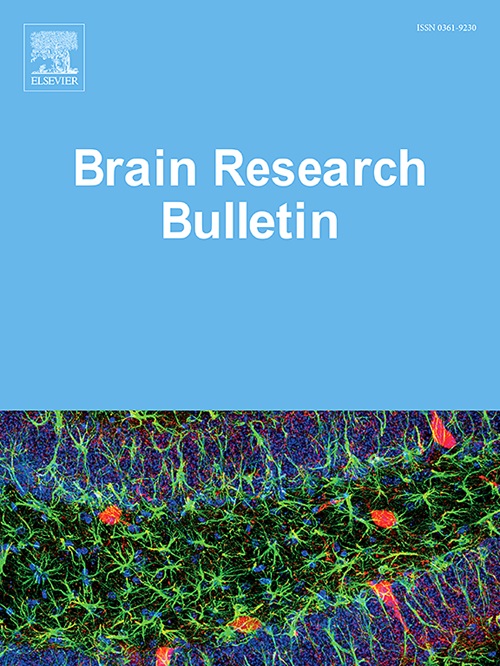Sleep deprivation disrupts vestibular compensation by activating TLR4/NF-κB/NLRP3 signalling in the deafferented vestibular nuclei
IF 3.7
3区 医学
Q2 NEUROSCIENCES
引用次数: 0
Abstract
We aimed to investigate whether sleep deprivation (SD) affects vestibular compensation and explore the underlying mechanisms. After unilateral labyrinthectomy (UL), adult mice were subjected to 6 h of SD for 5 days. Behavioural tests were performed to evaluate the vestibular recovery. RNA sequencing and bioinformatic analyses were conducted on the deafferented vestibular nuclei (VN) of UL mice with or without SD. Immunofluorescence and western blotting were used to verify the inflammatory responses, neuroplasticity, and pathways in the VN of UL+SD mice. Minocycline and TAK-242 were used to inhibit microglial activation and TLR4, respectively. Our findings suggest that SD significantly impaired vestibular compensation in UL mice. RNA sequencing identified upregulated immune- and inflammation-related pathways in the deafferented VN after SD, which was verified by microglial overactivation. Moreover, neuroplasticity was impaired, and inhibition of microglial proliferation with minocycline partially improved the impaired vestibular compensation during the early stages. Mechanistically, TLR4/NF-κB/NLRP3 pathway activation was predominantly involved in this process, and pharmacological inhibition of TLR4 inhibited NLRP3 activation in microglia and improved SD-induced vestibular compensation delay. Overall, this study illustrates that SD alters neuroplasticity and aggravates microglia-mediated neuroinflammation in deafferented VN by activating TLR4/NF-κB/NLRP3 signalling, which contributes to impaired vestibular compensation.
睡眠剥夺通过激活失传入前庭核中的TLR4/NF-κB/NLRP3信号来破坏前庭代偿。
我们的目的是研究睡眠剥夺是否影响前庭代偿并探讨其潜在机制。单侧迷路切除术(UL)后,给予成年小鼠6小时SD,持续5天。行为测试评估前庭功能恢复情况。对有无SD的UL小鼠前庭核失传入区(deaffented vestibular nucleus, VN)进行RNA测序和生物信息学分析。采用免疫荧光和western blotting验证UL+SD小鼠VN的炎症反应、神经可塑性和通路。米诺环素和TAK-242分别抑制小胶质细胞激活和TLR4。我们的研究结果表明,SD显著损害了UL小鼠的前庭代偿。RNA测序鉴定出SD后VN脱神经的免疫和炎症相关通路上调,并通过小胶质细胞过度激活证实了这一点。此外,神经可塑性受损,二甲胺四环素抑制小胶质细胞增殖在早期部分改善了受损的前庭代偿。在机制上,TLR4/NF-κB/NLRP3通路的激活主要参与了这一过程,药理抑制TLR4可抑制小胶质细胞中NLRP3的激活,改善sd诱导的前庭代偿延迟。总之,本研究表明,SD通过激活TLR4/NF-κB/NLRP3信号,改变神经可塑性,加重小胶质细胞介导的VN神经炎症,从而导致前庭代偿受损。
本文章由计算机程序翻译,如有差异,请以英文原文为准。
求助全文
约1分钟内获得全文
求助全文
来源期刊

Brain Research Bulletin
医学-神经科学
CiteScore
6.90
自引率
2.60%
发文量
253
审稿时长
67 days
期刊介绍:
The Brain Research Bulletin (BRB) aims to publish novel work that advances our knowledge of molecular and cellular mechanisms that underlie neural network properties associated with behavior, cognition and other brain functions during neurodevelopment and in the adult. Although clinical research is out of the Journal''s scope, the BRB also aims to publish translation research that provides insight into biological mechanisms and processes associated with neurodegeneration mechanisms, neurological diseases and neuropsychiatric disorders. The Journal is especially interested in research using novel methodologies, such as optogenetics, multielectrode array recordings and life imaging in wild-type and genetically-modified animal models, with the goal to advance our understanding of how neurons, glia and networks function in vivo.
 求助内容:
求助内容: 应助结果提醒方式:
应助结果提醒方式:


